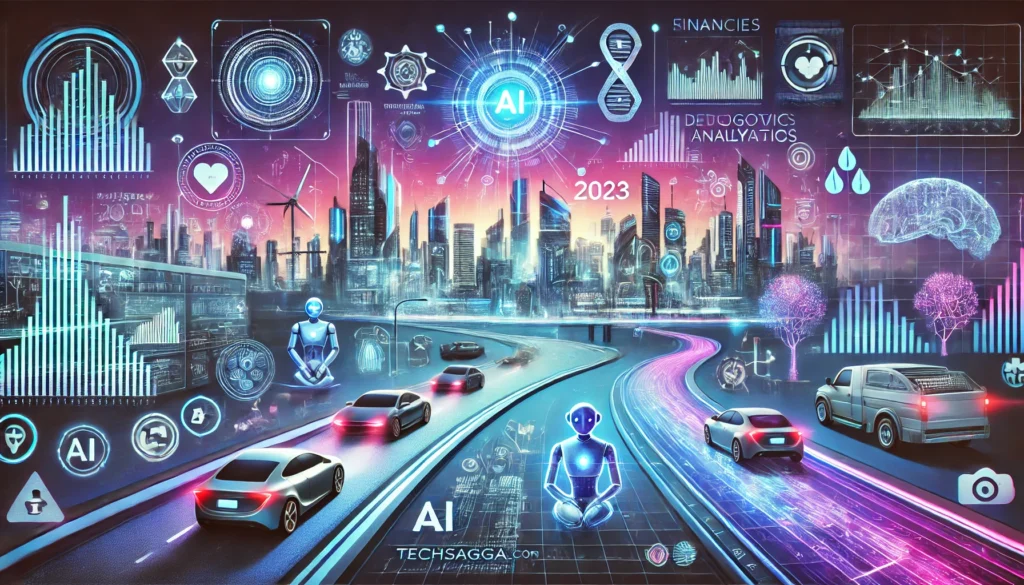The Future of Artificial Intelligence: How AI is Reshaping Our World in 2025 and Beyond

Artificial Intelligence (AI) has transitioned from science fiction to a transformative force in our daily lives. From revolutionizing industries to influencing global policies, the future of artificial intelligence is both thrilling and impactful. In this article, we’ll delve into the latest AI trends in 2023, explore the societal impact of AI, and examine how machine learning applications are driving innovation across diverse fields.
1. The Evolution of Artificial Intelligence: A Snapshot
The rise of artificial intelligence has been nothing short of extraordinary. Over the past decade, breakthroughs in computing power, data accessibility, and algorithmic advancements have propelled AI from theoretical research to real-world applications. Today, AI is no longer confined to tech giants—it’s a cornerstone of AI in business, AI in healthcare, and even AI in global governance.
A Brookings Institution report highlights how AI is reshaping industries at an unprecedented rate. From automating repetitive tasks to enabling groundbreaking medical discoveries, the impact of artificial intelligence is profound. But what lies ahead for AI? Let’s explore.
2. AI Trends in 2023: What’s Driving Innovation?
a) AI in Healthcare: Revolutionizing Patient Care
Healthcare is one of the most promising fields for AI applications. Machine learning algorithms are now capable of diagnosing diseases, predicting patient outcomes, and creating personalized treatment plans. For example, AI-powered systems can analyze medical images with remarkable precision, often outperforming human experts in detecting conditions like cancer at earlier stages.
b) AI in Business: Boosting Efficiency and Innovation
Businesses are increasingly adopting AI to streamline operations, enhance customer experiences, and make data-driven decisions. From AI-driven chatbots handling customer queries to predictive analytics forecasting market trends, AI in business is becoming indispensable. Companies leveraging AI are gaining a significant competitive advantage.
c) AI Ethics: Addressing the Challenges
As AI becomes more pervasive, ethical concerns are coming to the forefront. Issues like data privacy, algorithmic bias, and the potential for job displacement are sparking global debates. Organizations such as Brookings advocate for comprehensive AI ethics frameworks to ensure AI benefits society equitably.
3. How AI is Revolutionizing Key Industries
a) AI in Technology: Fueling the Next Wave of Innovation
The tech industry is leading the charge in AI adoption. From autonomous vehicles to smart home devices, AI in technology is unlocking new possibilities. Tech giants like Google, Amazon, and Tesla are investing heavily in AI research to maintain their competitive edge.
b) AI in Global Policy: Shaping Governance
Governments worldwide are recognizing AI’s potential to transform public services and address global challenges. According to Brookings, AI is being used to enhance national security, improve public service delivery, and tackle issues like climate change. However, policymakers must balance innovation with regulation to ensure responsible AI use.
4. The Future of Artificial Intelligence: What’s on the Horizon?
The future of artificial intelligence is brimming with potential. Here are some key developments to watch:
- Quantum Computing and AI: Quantum computing could revolutionize AI by solving problems currently deemed unsolvable, opening doors to unprecedented advancements.
- AI for Sustainability: AI is being harnessed to develop sustainable solutions, from optimizing energy usage to reducing waste.
- AI in Daily Life: As AI integrates further into our routines, expect smarter homes, personalized education systems, and enhanced entertainment experiences.
5. The Societal Impact of AI: Balancing Opportunities and Challenges
While the impact of artificial intelligence is overwhelmingly positive, it’s not without its challenges. Automation-driven job displacement is a growing concern, necessitating workforce reskilling initiatives. Additionally, ethical dilemmas like algorithmic bias and data privacy must be addressed to foster trust in AI systems.
Yet, the opportunities AI presents are immense. From curing diseases to combating climate change, AI has the potential to tackle some of humanity’s most pressing issues. By fostering collaboration among governments, businesses, and researchers, we can ensure AI’s benefits are widely shared.
Conclusion: Embracing the AI-Driven Future
The future of artificial intelligence is undeniably bright, with limitless potential to transform our world. From AI in healthcare to AI in global policy, its influence is evident across all sectors. As we move forward, it’s essential to embrace AI responsibly, addressing ethical concerns and ensuring its benefits are distributed equitably.
For tech enthusiasts and researchers, staying informed about the latest AI trends in 2023 and beyond is crucial. Whether you’re a business leader, a researcher, or simply curious about AI’s potential, the rise of artificial intelligence offers endless opportunities to innovate and make a meaningful impact.

